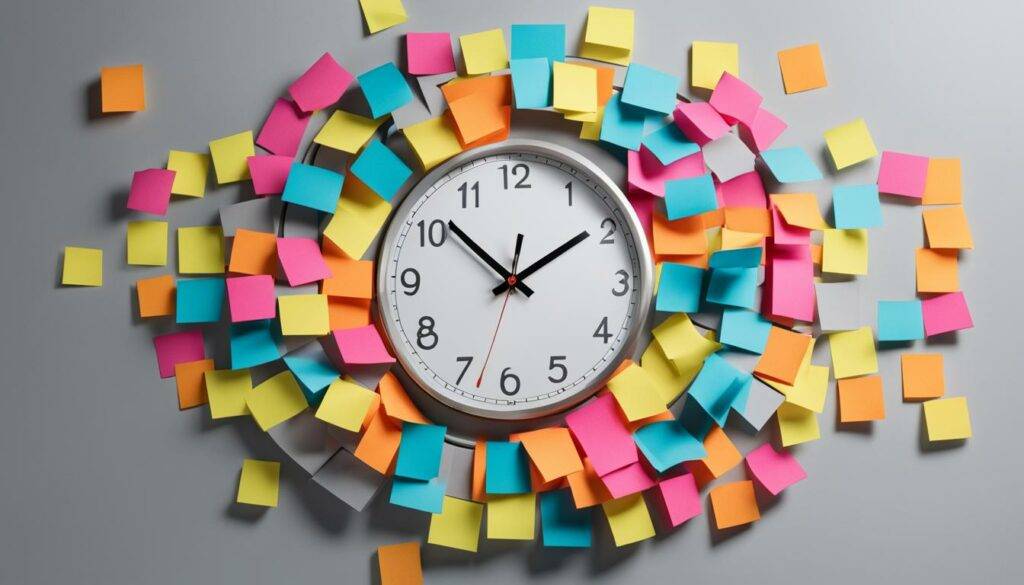Time management is the key to unlocking your true potential. By effectively using and controlling your time, you can achieve greater productivity and reduce stress in both your personal and professional life.
It’s time to take charge of your schedule and master the art of time management.
Effective time management starts with forming positive habits.
By implementing the right strategies, you can maximize your productivity and make the most of every minute. Let’s explore some essential habits for time management success.
Key Takeaways:
- Track how you spend your time to identify areas for improvement.
- Create a daily schedule and prioritize tasks using the Eisenhower Matrix.
- Tackle difficult tasks first and batch-process similar tasks.
- Set reasonable time limits and learn to say no.
- Avoid multitasking and keep your workspace organized.
Track Your Time and Identify Time-Blocking Opportunities
Effective time management requires a deep understanding of how you spend your time.
By tracking your activities, you can identify patterns, recognize areas of improvement, and make necessary adjustments to maximize your productivity.
One valuable tool for this purpose is RescueTime, a time-tracking application that records the time you spend on different tasks and provides insightful reports.
Creating a daily schedule with dedicated time blocks for each task is another crucial habit for effective time management. This practice helps you stay organized, maintain focus, and ensure that you allocate sufficient time to complete your tasks.
It is important to set realistic timelines and avoid overcommitting yourself, as this can lead to unnecessary stress and reduced productivity.
When planning your schedule, it is essential to prioritize your tasks based on their importance and urgency.
The Eisenhower Matrix is a useful framework that can guide you in categorizing your tasks into four quadrants: do immediately, schedule for later, delegate, and delete.
By focusing on the most important and urgent tasks first, you can make significant progress and prevent important tasks from being overshadowed by less critical ones.
| Quadrant | Urgent | Not Urgent |
|---|---|---|
| Important | Do Immediately | Schedule for Later |
| Not Important | Delegate | Delete |
In conclusion, tracking your time and identifying time-blocking opportunities are crucial steps in mastering time management.
By understanding how you spend your time, creating a well-planned schedule, and prioritizing your tasks effectively, you can enhance your productivity and achieve your goals more efficiently.
Incorporate these habits into your daily routine and watch as you gain control over your time and accomplish more in both your personal and professional life.

Say No, Avoid Multitasking, and Keep Things Organized
Effective time management requires the daily practice of essential habits.
One crucial habit is the ability to say no. By recognizing your limits and focusing on tasks that align with your strengths, you can avoid spreading yourself too thin and maintain a healthy work-life balance.
Avoiding multitasking is another key time management strategy. While it may seem efficient to juggle multiple tasks simultaneously, it actually hampers productivity and increases the risk of errors.
By focusing your attention on one task at a time, you can give it your undivided attention and complete it more efficiently.
Keeping things organized is crucial for optimizing time management techniques. A clean and clutter-free work environment promotes focus and efficiency.
Coordinate your computer files, maintain a well-organized calendar, and utilize time management tools like Slack, Dropbox, Google Calendar, and Canva to streamline processes and automate tasks.
Benefits of Saying No, Avoiding Multitasking, and Staying Organized:
- Reduced stress levels: By saying no to tasks that don’t align with your priorities, you can minimize overwhelm and focus on what truly matters.
- Improved productivity: Avoiding multitasking allows you to concentrate fully on one task at a time, leading to better quality work and faster completion.
- Enhanced efficiency: By keeping your work environment organized, you can easily locate files, resources, and materials, saving valuable time and minimizing distractions.
“The key to effective time management lies in mastering the art of saying no, avoiding multitasking, and keeping your work environment organized.”
To summarize, incorporating the habit of saying no, avoiding multitasking, and maintaining an organized work environment are essential daily habits for effective time management.
These strategies will not only reduce stress but also improve productivity and efficiency. By implementing these techniques into your routine, you can truly master your schedule and achieve optimal results in both your personal and professional life.

Set Goals, Prioritize, and Group Tasks
Setting goals is a fundamental practice for effective time management. By defining specific, measurable, attainable, relevant, and time-bound goals using the SMART method, you can provide clarity and direction to your daily activities.
Having well-defined goals helps you stay focused, motivated, and organized, enabling you to make better decisions about how to allocate your time effectively.
Once you have set your goals, the next step is to prioritize your tasks. The Eisenhower Matrix is a powerful tool that can assist you in categorizing your tasks based on their importance and urgency.
By dividing your tasks into four quadrants – do immediately, schedule for later, delegate, and delete – you can determine which tasks need your immediate attention and which can be deferred or eliminated.
Prioritizing tasks allows you to allocate your time and energy in a way that aligns with your goals and ensures that you are working on the most critical activities first.
Grouping similar tasks together is another strategy that can greatly enhance your time management skills. By batching tasks that require similar resources or skills, you can minimize context switching and maximize your focus and efficiency.
For example, if you have several phone calls to make, schedule them consecutively to avoid interruptions and keep your momentum.
Grouping tasks helps you maintain a flow state and optimize your cognitive resources, allowing you to accomplish more in less time.
| Task Group | Benefits |
|---|---|
| Administrative tasks | Streamlining paperwork and processes for increased efficiency |
| Creative tasks | Enhancing focus and creativity through dedicated time blocks |
| Research tasks | Optimizing information gathering and analysis |
In conclusion, mastering the art of setting goals, prioritizing tasks, and grouping similar activities is essential for effective time management.
These strategies allow you to align your actions with your objectives, work on the most important tasks first, and maximize your productivity.
By implementing these productivity habits and embracing efficient time management techniques, you can unlock your full potential, achieve your goals, and create a more balanced and fulfilling life.
Conclusion
Mastering time management habits is essential for achieving success and reducing stress in both your personal and professional life.
By implementing the tips and strategies mentioned above, you can enhance your productivity and achieve your goals more effectively.
Start by tracking your time and identifying time-blocking opportunities. This will help you understand how you’re spending your time and allow you to allocate it more efficiently.
Create a daily schedule and prioritize tasks using the Eisenhower Matrix. Tackle the difficult tasks first and avoid multitasking to stay focused and productive.
Keeping things organized is also crucial for effective time management. Say no to tasks that don’t align with your priorities and strengths, and keep your physical and digital spaces clutter-free.
Utilize time management tools, such as Slack, Dropbox, Google Calendar, and Canva, to automate and streamline processes.
Remember to set realistic goals, make use of time management tools, and continuously evaluate and adjust your habits to optimize your time management skills.
With dedication and consistent practice, you can become a master of your schedule and unlock your full potential in all areas of life.
FAQ
What is time management?
Time management involves efficiently using and controlling your time to maximize productivity.
What are the benefits of time management?
Time management has many benefits, including better work quality, less stress, more time for strategic projects, less procrastination, and increased self-confidence.
How can I better manage my time?
To better manage your time, it’s important to track how you’re spending it, create a daily schedule, prioritize tasks using the Eisenhower Matrix, tackle difficult tasks first, batch-process similar tasks, set reasonable time limits, learn to say no, avoid multitasking, and keep things organized.
How can I track my time?
One of the key habits for effective time management is to track how you’re spending your time. Using time-tracking tools like RescueTime can help you identify areas and habits that are hindering your productivity.
How can I create a daily schedule?
Creating a daily schedule with time blocks for different tasks can help you stay organized and focused. It’s important to set realistic timelines and give your undivided attention to each task.
How can I prioritize tasks?
Prioritization is crucial, and using the Eisenhower Matrix can help you categorize tasks based on importance and urgency.
What habits can improve time management?
Tackling the most difficult task first, batch-processing similar tasks, and setting reasonable time limits can improve time management skills.
How can I learn to say no?
Learning to say no is essential for effective time management. Recognizing your limits and focusing on tasks that align with your strengths can help you avoid spreading yourself too thin.
Why should I avoid multitasking?
Avoiding multitasking is important for time management, as it decreases efficiency and increases the risk of errors.
How can I keep things organized?
Keeping things organized, both physically and digitally, is crucial. Maintaining a clean work desk, coordinating computer files, and utilizing a calendar can help reduce clutter, increase efficiency, and streamline processes.
How can I set goals?
Setting goals is a fundamental practice for effective time management. Using the SMART method (Specific, Measurable, Attainable, Relevant, Time-bound) can help you set achievable and measurable goals.
How can I prioritize tasks?
Prioritizing tasks based on importance and urgency is crucial for optimal time management. The Eisenhower Matrix can guide you in categorizing tasks into four quadrants: do immediately, schedule for later, delegate, and delete.
How can I increase efficiency?
Grouping similar tasks together can help streamline workflow and increase efficiency. By focusing on one type of task at a time, you can minimize distractions and improve productivity.




























































